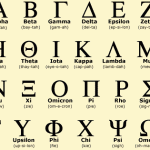Ever wondered what deuteroproto means in Luke 6:1? If you’re like me, probably not.
But about two months ago, as I was preparing commentary on Luke 6:1-5, I fell headlong into the debate swirling around this difficult word. It literally means “second-first” and while the majority of scholars today believe the word is not original and should be removed from the text, I was uncomfortable with such a conclusion. It seemed to me they had little textual basis for removing the word, and were doing so only because they didn’t know what it meant in context.
So I started studying the word, and I made a post about my progress on it a few weeks ago. I came up with a theory which seems to make good sense of the word, and which helps bring significance to the surrounding context. I was pretty excited about it, but the explanation of the word for the commentary required less than one paragraph to explain. I had read about 1000 pages on the word, and spent dozens of hours reading and researching it. It seemed a shame to summarize all that into one paragraph.
So, simply to dignify the hours I spent studying one word, and to put all my research in one place for future reference, I wrote an article about my findings. If you are curious about it at all, you can read the article by clicking the link below. Also, if you follow me on Scribd, you can get it from there.
What’s on Second Who’s on First Luke 6 1
Happy studying!




You should definitely make this a Kindle book..I can show you how, and put it on Amazon either for free or $1.00. That’s a common thing now..99 cent books….I would have bought it…but since you’re giving it away on Scribd…:)
Hmmm. Yes I should probably do that.
I finished this right before I learned about Kindle ebooks.
I’ve studied the scriptures on the calendar a bit and I’d like to share my thoughts:
After the instructions at Exodus 19:10-11
10* And the LORD said unto Moses, Go unto the people, and sanctify them to day and to morrow, and let them wash their clothes,
11 And be ready against the third day: for the third day the LORD will come down in the sight of all the people upon mount Sinai.
in which God declares the fourth and fifth days of the third month (see Ex. 19:1) as days of sanctification, and so principal days – ‘proto’-types?. These are the 49th and 50th days of the Feast of Weeks. The Greek word deuteroprotos (the second principal day) tells us it was the 50th and last day of the Feast of Weeks. It was a two-day long sabbath.
Excellent observation, and another reason why no one knows the day or the hour. Shavuot (the beginning of Pentecost) is also the two-day feast on which the Tekiyah Gedolah, or Last Trumpet, was performed on the shofar or ram’s horn, in commemoration of God’s trumpet on Sinai (Ex. 19 & 20). The connection to Shavuot has been lost since 70 A.D., so now the Tekiyah Gedolah is associated with Rosh Hashanah, the Feast of Trumpets, but that was not the case when Paul was writing; at that time it commemorated the giving of the Law on Sinai (when God, or perhaps an angel, but certainly not man, blew the trumpet). The “last blast” of this series of 100 blasts is blown for as long as the blower has breath. That blast is the “Last Trump.” When you hear it, look up!
Thank you so much! Knowledge is certainly increasing! Add to this that the last day of Pentecost and the firstfruits of New Wine is the deuteroproto of Acts 2:1 (when the Day of Pentecost had FULLY come), meaning the Holy Spirit was given to the church on the one day when wheat and new wine were offered together at the Temple–communion! And that means the prophecy of the Firstfruits of Pentecost has yet to be fulfilled (Lev. 23:17). Blessings!